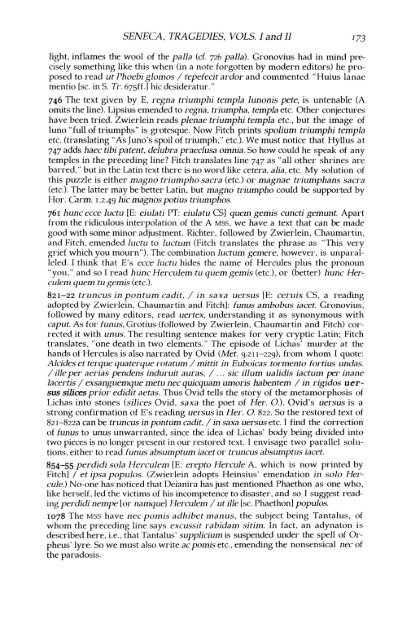MOUSEION - Memorial University of Newfoundland
MOUSEION - Memorial University of Newfoundland
MOUSEION - Memorial University of Newfoundland
You also want an ePaper? Increase the reach of your titles
YUMPU automatically turns print PDFs into web optimized ePapers that Google loves.
SENECA. TRAGEDIES. VOLS. I and II 173<br />
light. inflames the wool <strong>of</strong> the palla (d. 726 palla). Gronovius had in mind precisely<br />
something like this when (in a note forgotten by modern editors) he proposed<br />
to read ut PllOebi glomos / tepefecit ardor and commented" Huius lanae<br />
mentio [Sc. in S. Tr. 675ff.] hic desideratur."<br />
746 The text given by E. regna triumphi templa Iunonis pete. is untenable (A<br />
omits the line). Lipsius emended to regna. triumpha, templa etc. Other conjectures<br />
have been tried. Zwierlein reads plenae triumphi templa etc.. but the image <strong>of</strong><br />
Juno "full <strong>of</strong> triumphs" is grotesque. Now Fitch prints spolium triumphi templa<br />
etc. (translating "As Juno's spoil <strong>of</strong> triumph," etc.). We must notice that Hyllus at<br />
747 adds haec tibi patent, delubra praec1usa oITmia. So how could he speak <strong>of</strong> any<br />
temples in the preceding line? Fitch translates line 747 as "all other shrines are<br />
barred," but in the Latin text there is no word like cetera, alia, etc. My solution <strong>of</strong><br />
this puzzle is either magno triumpho sacra (etc.) or magnae triumphans sacra<br />
(etc.). The latter may be better Latin, but magno triumpho could be supported by<br />
HoI'. Carm. 1.2-49 hiemagnos potius triwnphos.<br />
761 hunc ecce luctu [E: eiulati PT: eiulatu CS] quem gemis cuncti gemunt. Apart<br />
from the ridiculous interpolation <strong>of</strong> the A MSS, we have a text that can be made<br />
good with some minor adjustment. Richter. followed by Zwierlein, Chaumartin,<br />
and Fitch, emended luctu to luctum (Fitch translates the phrase as "This very<br />
grief which you mourn"). The combination luctum gemere, however, is unparalleled.<br />
1 think that E's ecce luctu hides the name <strong>of</strong> Hercules plus the pronoun<br />
"you," and so I read hunc Herculem tu quem gemis (etc.), or (better) llUnc Hercu1em<br />
quem tu gemis (etc.).<br />
821-22 truncus in pontum cadit, / in saxa uersus [E: ceruix CS, a reading<br />
adopted by Zwierlein, Chaumartin and Fitch]: funus ambobus iacet. Gronovius,<br />
followed by many editors. read uertex. understanding it as synonymous with<br />
caput. As for fun us, Grotius (followed by Zwierlein. Chaumartin and Fitch) corrected<br />
it with unus. The resulting sentence makes for very cryptic Latin; Fitch<br />
translates, "one death in two elements." The episode <strong>of</strong> Lichas' murder at the<br />
hands <strong>of</strong> Hercules is also narrated by Ovid (Met. 9.211-229), from whom I quote:<br />
A1cides et terque quaterque rotatwn / mittit in Euboicas tormento fortius undas.<br />
/ iIle per aerias pendens induruit auras, / ... sic ilIum ualidis iactum per inane<br />
lacertis / exsanguemque metu nec quicquam umoris habentem / in rigidos uersus<br />
silkes prior edidit aetas. Thus Ovid tells the story <strong>of</strong> the metamorphosis <strong>of</strong><br />
Lichas into stones (siJices Ovid. saxa the poet <strong>of</strong> Her. 0.). Ovid's uersus is a<br />
strong confirmation <strong>of</strong> E's reading uersus in Her. 0. 822. So the restored text <strong>of</strong><br />
821 -822a can be trwlCUS in pontum cadit. / in saxa uersus etc. I find the correction<br />
<strong>of</strong> fWlUS to unus unwarranted. since the idea <strong>of</strong> Lichas' body being divided into<br />
two pieces is no longer present in our restored text. I envisage two parallel solutions.<br />
either to read funus absumptum iacet or truncus absumptus iacet.<br />
854-55 perdidi sola Herculem [E: erepto Hercule A. which is now printed by<br />
Fitch] / et ipsa populos. (Zwierlein adopts Heinsius' emendation in solo He.rcule.)<br />
No-one has noticed that Deianira has just mentioned Phaethon as one who,<br />
like herself. led the victims <strong>of</strong> his incompetence to disaster. and so I suggest reading<br />
perdidi nempe [or namquel Herculem / ut ille [Sc. Phaethon] populos.<br />
1078 The MSS have nec pomis adhibet manus. the subject being Tantalus. <strong>of</strong><br />
whom the preceding line says excussit rabidam sitim. In fact. an adynaton is<br />
described here. i.e., that Tantalus' supplicium is suspended under the spell <strong>of</strong> Orpheus'<br />
lyre. So we must also write ac pomis etc.. emending the nonsensical nec <strong>of</strong><br />
the paradosis.

















